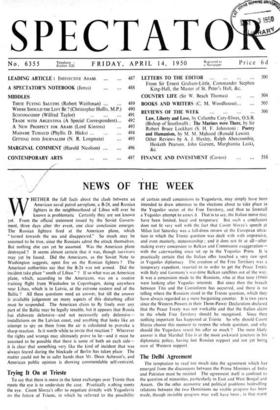Trying It . On at Trieste
To'say that there is more in the latest exchanges over Trieste than meets the eye is to understate the case. Practically nathing meets the eye. Count Sforza's offer to negotiate directly with Yugoslavia on the future of Trieste, in which he referred to the possibility of certain small concessions to Yugoslavia, may simply have been intended to draw attention to the elections about to take place in the Yugoslav sector of the Free Territory, and thus to forestall a Yugoslav attempt to annex it. That is to say, the Italian move may have been limited, local and temporary But such a conclusion does not fit very well with the fact that Count Sforza's speech al Milan last Saturday was a full-dress review of the European situa- tion in which the Trieste question was dealt with with impressive, and even masterly, statesmanship ; and it does not fit at all—after making every concession to Balkan and Communist exaggeration— with the caterwauling since set up in the Yugoslav Press. It is practically certain that the Italian offer touched a very raw spot in Yugoslav diplomacy. The creation of the Free Territory was a temporary expedient, resorted to in order to get the Peace Treaty with Italy and Germany's war-time Balkan satellites out of the way. It was a concession made to the Russians, who at that time (1946) were looking after Yugoslav interests. But since then the breach between Tito and the Cominform has occurred, and there is no telling where the Russians stand in the Trieste question, which they have always regarded as a mere bargaining counter. It is two years since the Western Powers in their Three-Power Declaration declared that the Peace Treaty was not workable and that the Italian claim to the whole Free Territory should be recognised. Since. then nothing important has happened at Trieste. So why should Count Sforza choose this moment to reopen the whole question, and why should the Yugoslays resent his offer so much ? The most likely answer is that Marshal Tito is at the most awkward juncture in his diplomatic policy, having lost Russian support and not yet being sure of Western support.






































